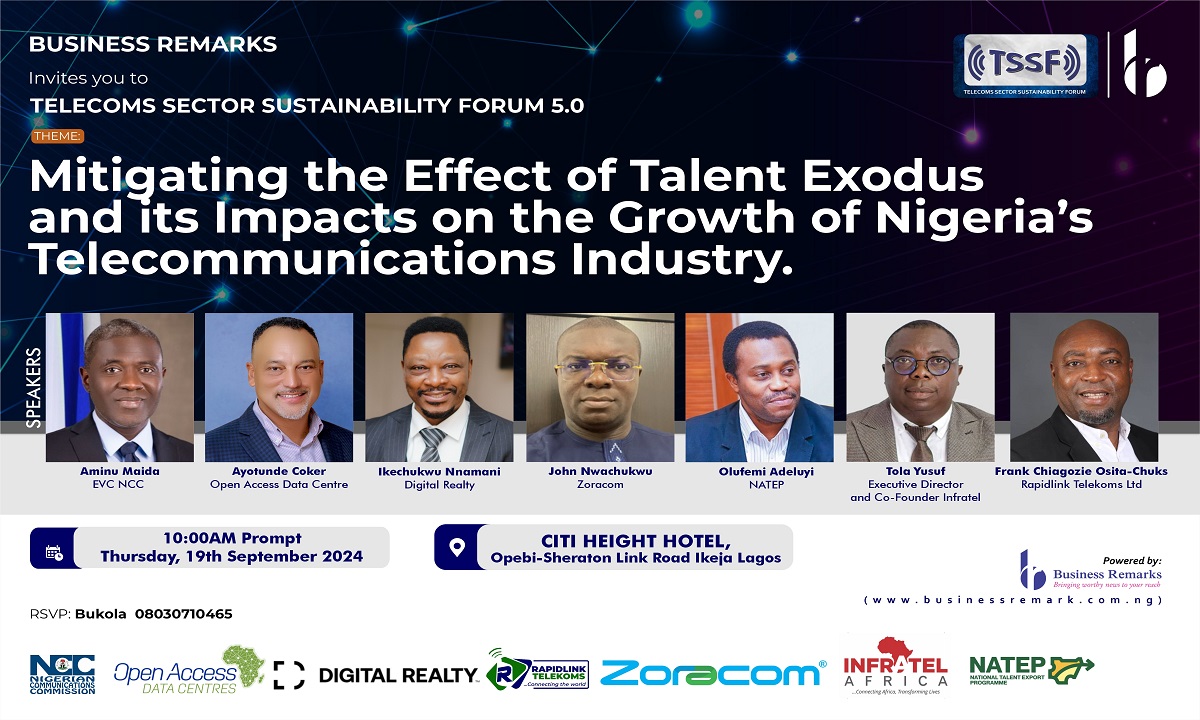Telecom
TSSF 5.0: Industry Leaders to Address Brain Drain Challenge in Nigeria’s Telecom Industry

Leading figures in the telecommunications and information and communications technology (ICT) sectors are set to gather for the fifth edition of the Telecom Sector Sustainability Forum (TSSF 5.0).

The event themed “Mitigating the Effect of Talent Exodus and its Impacts on the Growth of Nigeria’s Telecommunications Industry” is carefully designed to explore and highlight one of the critical challenges facing the sustainability of Nigeria’s telecommunications sector. This conference, organised by Business Remarks, is scheduled to take place on Thursday, 19th September 2024, at CITIHeight Hotel, Opebi-Sheraton Link, Ikeja Lagos, by 10:00 a.m (WAT).
Nigeria CommunicationsWeek report that this conference will feature keynote speeches, thought-provoking discussions, innovative presentations, and networking opportunities from renowned industry experts, providing stakeholders with valuable insights, knowledge, and practical strategies to rethink the possibilities and challenges facing the sector.
Confirmed speakers include the Executive Vice Chairman of the Nigerian Communications Commission (NCC), Dr Aminu Maida; the National Coordinator, the National Talent Export Programme (NATEP), Dr Olufemi Adeluyi; Chairman of ALTON, Engr Gbenga Adebayo; Digital Realty Chief Executive Officier, Engr Ikechukwu Nnamani; Open Access Data Center CEO, Dr Ayotunde Coker; Zoracom CEO, John Nwachukwu; Co-Founder, Infratel Africa, Mr Tola Yusuf among others.
Speaking about the event, the convener of the forum and Managing Editor of Business Remarks, Bukola Olanrewaju, noted that the Nigerian telecom sector is currently grappling with a multitude of challenges. These include unreliable power supply, rising operational costs, frequent call drops, poor network coverage and the high naira-to-dollar exchange rate has hampered telecom companies’ ability to invest in new equipment and infrastructure, further exacerbating these issues.
“Sadly, the sector has started to experience a huge depletion in its talent workforce, a severe brain drain,” she said.
Olanrewaju stressed that the escalating depletion of talent and skilled workforce in critical sectors of the Nigerian economy is a pressing concern. “This loss of human capital poses a significant threat to the nation’s productivity and economic growth.
“The brain drain exacerbates existing skill shortages, hindering the country’s ability to innovate and develop domestically. If left unchecked, this trend could cripple the Nigerian economy.”
According to the International Organization for Migration (UN Migration), international migration is shaped by economic, geographic, demographic, political, and other factors.
Studies have also revealed that the departure of skilled workers diminishes the productivity of various industries, ultimately impacting economic output and growth. Companies and businesses may struggle to find qualified personnel or workforce, leading to decreased efficiency and competitiveness in both domestic and international market space.
The technology and telecom sector have seen a considerable loss of talents within the last 5 years to various western countries.
Data from the National Bureau of Statistics also stated that Nigeria has lost about 10 billion dollars annually due to brain drain (mass migration) since 2010. Similarly, data from the World Bank show that Nigeria’s GDP growth has been negatively affected by the migration of skilled workers.
The Telecom Sector Sustainability Forum fifth edition (TSSF 5.0) is a platform for stakeholders, experts, and policymakers to discuss the root causes, impacts, and potential solutions to this pressing issue. By bringing together diverse perspectives and expertise, this event aims to contribute to the development of effective policies and initiatives to mitigate the effects of brain drain and promote the growth of the Nigerian economy.
Telecom
NCC Asks Consumers to Monitor Data Usage to Authenticate Consumption

Nigerian Communications Commission (NCC) has charged the over 174 million telecoms subscribers in the country to constantly monitor their data usage to authenticate their consumption level.

This follows concerns being raised by telecoms consumers about the rapidity of data depletion on their devices.
The Commission particularly enjoined the consumers to always contact their service providers to make requests for cases of discrepancies noted in their data usage.
While the consumers are expected to contact their service providers to request for their usage history/statement where inconsistency exists in their data usage as first step, the Commission said they may also escalate such issues to the Commission through its toll-free Number 622 and social media platforms, especially if their requests are not satisfactorily handled.
The Commission, which also made some clarifications regarding the concerns being raised by the consumers around data usage, said the need to inform the consumers on their concerns is part of its commitment to protect and appropriately inform and educate the telecom consumer on industry issues.
Making further clarifications around data speed and usage, the Commission said data speed is the speed at which data is transferred between two devices, measured in megabits per second (Mbps or mbps), stressing that given the spread of Internet services and the immense investment in the sector, data rates have continued to increase and users may be unaware of how to measure data speed.
The telecoms regulator explained further that websites such as www.fast.com also provide an easy way for consumers to measure Internet speed on any device at any location.
“The higher the data speed, the quicker pages load-downloads and uploads-occur and expectedly, the quicker data bundles are exhausted. So, as telecom consumers are able to do more on devices in less time, some consumers’ devices & network service providers make it possible to limit data speed to help users manage data usage better.
“In any case, most devices now include functions to measure data used by devices and it is imperative that users monitor same to authenticate data usage, such as applications left running on devices. Therefore, where discrepancies occur users may contact their service provider to request for their usage history/statement. If request is not dealt with satisfactorily then, users can contact NCC by calling 622 or engage the Commission via its social media platforms”.
It added that the data usage experience is a function of location, network equipment and users connected in a particular location.
Telecom
Phone Theft: AMCODET Urges Mandatory Registration @ Point of Purchase

Association of Mobile Communication Device Technicians of Nigeria (AMCODET), has called on the Nigerian Communications Commission (NCC) to make it mandatory for mobile phones to be registered at the point of purchase.

According to Kehinde Apara, president of AMCODET, implementing this registration process would significantly help in combating phone theft and assist in locating stolen devices.
Apara, made this appeal in an interview in Lagos on Monday.
He stated, “Registration of mobile phones will reduce theft to the barest minimum, as it will be difficult for thieves to sell registered stolen phones.”
Apara explained that the registration of new phones would also help to reduce the harassment faced by technicians by security agencies.
“So many of our members have been labelled accomplices in theft cases, because customers bring stolen phones to them to repair. We believe this is unfair to such innocent people,” he said.
He went on to highlight that the NIN-SIM linkage, which was originally an idea brought forward by AMCODET, was created to curb insecurity and theft.
However, Apara pointed out that “It is not enough.”
He stressed the need for further measures to ensure the proper registration of mobile phones, emphasising that such a step would make it easier for technicians to identify stolen devices brought in for repair or flashing.
“AMCODET has been at the forefront of organising seminars on the security of mobile phones and has also been sensitising the public and authorities on the challenges faced by the association due to phone theft. There is no way our members can identify if a phone is stolen when brought to them for repairs or flashing, but if the phone is registered, the technician can more easily identify it,” he explained.
Apara also expressed a desire for closer collaboration with security agencies, saying, “We want to work with security agencies to ensure that phones are properly registered, theft is prevented, and thieves are brought to book.”
In additin to the call for phone registration, Apara appealed to individuals and the private sector to support efforts to develop the mobile phone industry in Nigeria.
He remarked, “We need individuals’ support to develop our industry, rather than relying on government for everything.”
He emphasised that Nigeria has the capacity to develop its own technology and reduce reliance on imported devices, “With the support of individuals and the private sector, Nigerians can begin to develop its own technology, rather than relying on imported technology.”
Apara expressed optimism for the future of the mobile phone industry in Nigeria, believing that with the right support, the country could build its own technological solutions and move towards greater self-reliance.
“We can develop our own technology.”
“But we need the support of individuals and organisations to make it happen,” he said.
Credit: NAN
Telecom
Apple Faces €150M Fine in France Over Alleged Antitrust Violations

French antitrust regulators have fined Apple 150 million euros ($162 million) over its App Tracking Transparency (ATT) feature, which is facing scrutiny in multiple European countries.

The French Competition Authority ruled that Apple’s implementation of ATT was “neither necessary nor proportionate to the company’s stated goal to protect user data” and unfairly penalized third-party publishers.
Alongside the financial penalty, Apple has been ordered to publish the decision on its website for seven days. The ruling comes amid ongoing investigations in Germany, Italy, Romania, and Poland into ATT, which Apple introduced in 2021 as a privacy safeguard.
ATT requires apps to obtain explicit user consent via a pop-up before tracking activity across other apps and websites. If users decline, the app loses access to their advertising identifier, limiting targeted advertising. Critics argue that the system disproportionately benefits Apple by restricting competitors while promoting its own advertising services.
The French watchdog found that ATT forces users to navigate excessive consent windows for third-party apps on iPhones and iPads, making the process unnecessarily complicated.
Additionally, Apple’s system requires users to opt out of ad tracking twice rather than once, which the authority said undermines the feature’s neutrality and causes economic harm to app publishers and ad service providers.
The ruling emphasized that smaller publishers, which rely heavily on third-party data collection for revenue, are particularly affected.
The French regulator initially declined to impose emergency measures in 2021 after complaints from the advertising industry, but continued its investigation, ultimately leading to Monday’s decision.

 Telecom2 days ago
Telecom2 days agoMTN, Lynk Global Make Africa’s First Satellite-to-Mobile Call

 E-Business2 days ago
E-Business2 days agoSystemSpecs’s Subsidiary Deelaa Becomes Whatadeal

 E-Financial2 days ago
E-Financial2 days agoNigeria Gets Fresh $500m World Bank Loan for Economic Stimulus Programme

 General News2 days ago
General News2 days agoSERAP Asks National Assembly to Drop Bill to Jail Nigerians who Fail to Vote

 E-Financial2 days ago
E-Financial2 days agoUninsured Depositors of Heritage Bank to Receive Liquidation Dividends In April – NDIC

 Telecom2 days ago
Telecom2 days agoSmart Treasure Investment Team’s Initiatives Eradicate Poverty, Says Aminu

 E-Business2 days ago
E-Business2 days agoCybersecurity Firm Says It’s Time to Back it Up, As the World Marks World Backup Day

 General News2 days ago
General News2 days agoFG to Elevate Enugu Tech Festival to National Event – Minister

























